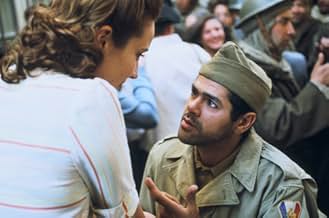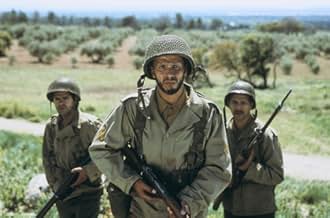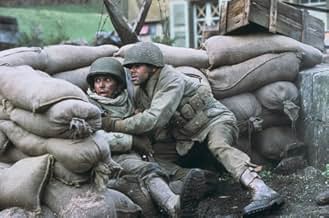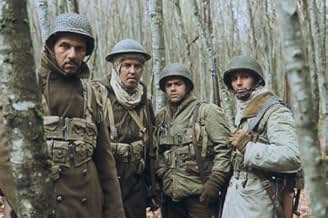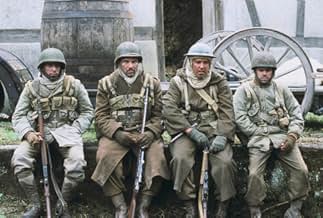IMDb रेटिंग
7.0/10
15 हज़ार
आपकी रेटिंग
द्वितीय विश्व युद्ध के दौरान, चार उत्तरी अफ्रीकी पुरुष उस देश को नाजी उत्पीड़न से मुक्त करने और फ्रांसीसी भेदभाव से लड़ने के लिए फ्रांसीसी सेना में भर्ती होते हैं।द्वितीय विश्व युद्ध के दौरान, चार उत्तरी अफ्रीकी पुरुष उस देश को नाजी उत्पीड़न से मुक्त करने और फ्रांसीसी भेदभाव से लड़ने के लिए फ्रांसीसी सेना में भर्ती होते हैं।द्वितीय विश्व युद्ध के दौरान, चार उत्तरी अफ्रीकी पुरुष उस देश को नाजी उत्पीड़न से मुक्त करने और फ्रांसीसी भेदभाव से लड़ने के लिए फ्रांसीसी सेना में भर्ती होते हैं।
- 1 ऑस्कर के लिए नामांकित
- 9 जीत और कुल 17 नामांकन
फ़ीचर्ड समीक्षाएं
It's 1943 Algeria. Muslims are recruited to fight for France. They go to Morocco to train and then arrive in Italy in 1944 to fight with the Allies. Saïd Otmari is poor illiterate mountain goat herder. Messaoud Souni is well spoken and falls for a French woman. Sergeant Martinez is a hardened leader willing to send the green recruits into suicidal charges but he hides his personal Arab connections. The men face racism in many blatant ways and Abdelkader gives voice to getting more equality.
This is an interesting part of the war that has been white-washed. The movie does struggle with a simple message as the men themselves have infighting about the war and their cause. Some of them fight for the money while others bought into the slogans. There is some good action and a solid final battle.
This is an interesting part of the war that has been white-washed. The movie does struggle with a simple message as the men themselves have infighting about the war and their cause. Some of them fight for the money while others bought into the slogans. There is some good action and a solid final battle.
So you've done a great piece of work, and are awaiting your just rewards. Somehow along the way, someone else, by colour, creed, or connections, get all the recognition that you're due credit for. You feel frustrated, but you think of your rice bowl, and decide to grit your teeth and bear it, calling it just another day, secretly longing for a time where you are empowered to do something about it.
In the liberation of France during WWII, North African men were recruited and enlisted in the French army in the fight against the Nazis. Why do they do it? One reason is to escape poverty, and the holding on to the glimmer of hope that they can be accepted, when the war is over, as equals based on their fight for the "motherland". These soldiers, mujahedeens, fought hard, often being in the frontline, but always overlooked when it comes to recognition of basic military welfare and promotions, not that these rewards will cost an arm or a leg, nor are the fighters so hard up for them. All they're asking for was fair treatment, but all they got was discrimination.
Yes, and that is the pain. WWII movies are aplenty, but Days of Glory offered a unique look at the battles by a group of men, for what they deem their motherland and will defend with their blood, and what more, for a land of people who do not see them as equals. Loving someone who does not love you back, sounds familiar? And it's not just love, but sworn allegiance to protect at all costs.
The movie is well paced and straddled moments of action and quiet contemplation with aplomb. Credit must go to the ensemble cast of actors who play the warriors of North Africa, as they battle both the enemies on French soil, as well as enemies of men's heart. They grapple with trying to remain rational in their reason(s) to do what they're doing.
At times, watching this movie made me think about the recent flurry of mails to the press about foreign talent and the issue of citizenship, about NS obligations and whether PRs will flee at the first signs of trouble, or stand shoulder to shoulder with citizens (also, who are those who will flee?) in defending our land. What are the issues of contention, discrimination against, or general presumptions about foreigners here?
Those expecting all out battle scenes might be disappointed. In truth the movie's never about the glorification of gore, violence and war - most scenes aren't really blood splattering to draw in the crowds. Instead, if you'd prefer moments where you can think out loud about the issues presented, then this is for you. However, the final battle would please action fans, as it is well choreographed and executed, and you feel both the pain and victory from a bunch of tightly knit soldiers trying their very best to defend a small town, in a samurai- seven-ish sort of way, also reminiscent of Saving Private Ryan's somehow.
If you've missed this during the French Film Festival, don't fret. I believe this movie is also slated for general release. Keep a look out for it!
In the liberation of France during WWII, North African men were recruited and enlisted in the French army in the fight against the Nazis. Why do they do it? One reason is to escape poverty, and the holding on to the glimmer of hope that they can be accepted, when the war is over, as equals based on their fight for the "motherland". These soldiers, mujahedeens, fought hard, often being in the frontline, but always overlooked when it comes to recognition of basic military welfare and promotions, not that these rewards will cost an arm or a leg, nor are the fighters so hard up for them. All they're asking for was fair treatment, but all they got was discrimination.
Yes, and that is the pain. WWII movies are aplenty, but Days of Glory offered a unique look at the battles by a group of men, for what they deem their motherland and will defend with their blood, and what more, for a land of people who do not see them as equals. Loving someone who does not love you back, sounds familiar? And it's not just love, but sworn allegiance to protect at all costs.
The movie is well paced and straddled moments of action and quiet contemplation with aplomb. Credit must go to the ensemble cast of actors who play the warriors of North Africa, as they battle both the enemies on French soil, as well as enemies of men's heart. They grapple with trying to remain rational in their reason(s) to do what they're doing.
At times, watching this movie made me think about the recent flurry of mails to the press about foreign talent and the issue of citizenship, about NS obligations and whether PRs will flee at the first signs of trouble, or stand shoulder to shoulder with citizens (also, who are those who will flee?) in defending our land. What are the issues of contention, discrimination against, or general presumptions about foreigners here?
Those expecting all out battle scenes might be disappointed. In truth the movie's never about the glorification of gore, violence and war - most scenes aren't really blood splattering to draw in the crowds. Instead, if you'd prefer moments where you can think out loud about the issues presented, then this is for you. However, the final battle would please action fans, as it is well choreographed and executed, and you feel both the pain and victory from a bunch of tightly knit soldiers trying their very best to defend a small town, in a samurai- seven-ish sort of way, also reminiscent of Saving Private Ryan's somehow.
If you've missed this during the French Film Festival, don't fret. I believe this movie is also slated for general release. Keep a look out for it!
There's two types of French film .
1 ) The sort that is beloved by Cahiers Du Cinema that often feature people standing about talking about existentialist themes and often don't find a market outside France
2 ) The sort that is despised by Cahiers Du Cinema that often feature action and plot and appeal to an international market
DAYS OF GLORY is certainly in the second camp . The problem is that it's a bit too international . The theme of colonial soldiers fighting for the mother country could have easily have featured British dominion troops fighting in the Boer war , of Indian troops fighting at El Alamein or even of black Americans fighting in the second world war . Some people on this page have criticised this movie as not being a Gallic version of GLORY and you can see their point . There's little in the way of an idiosyncratic voice
Worse still despite the subtitles you could easily be watching a war film that was made in Hollywood . Much of the plot could have easily been lifted from Sam Fuller's THE BIG RED ONE as the story jumps from North Africa , Italy and eventually France . It's also impossible not to notice that the final climatic battle owes a lot to the climax of SAVING PRIVATE RYAN . Perhaps that's why DAYS OF GLORY received high praise down to its familiar story that English speaking fans of war films have seen so many times before ?
It could have been much worse though . On a technical level it's a competent enough movie and it doesn't go overboard that the Goumier troops are some how slaves press-ganged in to joining the Free French forces but it does effectively ignore the sometimes horrendous reputation Goumier troops had in Axis territories where women are concerned . The 1960 Italian film TWO WOMEN goes in to this in detail and you can imagine that's why the protagonists service in Italy is skated over very slightly . One wonders if the producers might have been worried about an international audience being alienated by bringing up the subject in any length ? As it it stands DAYS OF GLORY is a good enough war film though very traditional
1 ) The sort that is beloved by Cahiers Du Cinema that often feature people standing about talking about existentialist themes and often don't find a market outside France
2 ) The sort that is despised by Cahiers Du Cinema that often feature action and plot and appeal to an international market
DAYS OF GLORY is certainly in the second camp . The problem is that it's a bit too international . The theme of colonial soldiers fighting for the mother country could have easily have featured British dominion troops fighting in the Boer war , of Indian troops fighting at El Alamein or even of black Americans fighting in the second world war . Some people on this page have criticised this movie as not being a Gallic version of GLORY and you can see their point . There's little in the way of an idiosyncratic voice
Worse still despite the subtitles you could easily be watching a war film that was made in Hollywood . Much of the plot could have easily been lifted from Sam Fuller's THE BIG RED ONE as the story jumps from North Africa , Italy and eventually France . It's also impossible not to notice that the final climatic battle owes a lot to the climax of SAVING PRIVATE RYAN . Perhaps that's why DAYS OF GLORY received high praise down to its familiar story that English speaking fans of war films have seen so many times before ?
It could have been much worse though . On a technical level it's a competent enough movie and it doesn't go overboard that the Goumier troops are some how slaves press-ganged in to joining the Free French forces but it does effectively ignore the sometimes horrendous reputation Goumier troops had in Axis territories where women are concerned . The 1960 Italian film TWO WOMEN goes in to this in detail and you can imagine that's why the protagonists service in Italy is skated over very slightly . One wonders if the producers might have been worried about an international audience being alienated by bringing up the subject in any length ? As it it stands DAYS OF GLORY is a good enough war film though very traditional
For the first time this year the Weinstein Company has made something bearable --Hell, actually something good. The film is called Days of Glory (a title strangely reconfigured from Indigènes) and it chronicles a regiment in the war against Nazism, or, as the French call it, "liberty". But, the catch here is that these soldiers, they aren't French: They're Algerian and Morroquian. The film first suffers from superfluous paper-mâché clichés in order to demonstrate racial inequality, not as a subtle character study, but rather as an insolent whole which creates that annoying been-there, done-that feeling. Such a scene occurs when Abdelkader (Sami Bouajila) realizes that not all African troops are getting tomatoes, where as the French are. What does he do? He smashes them so "Nobody can have them". Director Rachid Bouchareb narrative is also first a bit fragmented, jumping from country to country as if they were stones. Eventually, it develops into an assured rhythm which corroborates with the film.
Brilliance in Days of Glory neither comes from ideas nor direction, but rather, through the magisterial acting, prized at Cannes, and small war vignettes. They are gripping and moving, like all war movies should be. These war scenes are powerful, and that is what makes up Days of Glory, because in the end, Days of Glory is one of the few good but flawed war films worth a damn. It has power and it is evident that it uses it wisely and vigorously.
Brilliance in Days of Glory neither comes from ideas nor direction, but rather, through the magisterial acting, prized at Cannes, and small war vignettes. They are gripping and moving, like all war movies should be. These war scenes are powerful, and that is what makes up Days of Glory, because in the end, Days of Glory is one of the few good but flawed war films worth a damn. It has power and it is evident that it uses it wisely and vigorously.
France 1943. Indigenous Moroccan soldiers still wet behind the ears are called in to the 17th infantry to defend their 'motherland' against the ongoing German occupation. Their goodness and patriotism are unmistakable and Saïd (Jamel Debbouze) remarks how "If I liberate a country, it's my country, even if I've never even been there." Here is a good-hearted contingent of North African soldiers who hope to catch some of the victory's glory, but whom are repeatedly shifted to the backseat because of their name, skin and accent.
There was no way I would miss a film that French president Chirac cites as the sole reason he immediately rectified the pension plan for indigenous veterans, offering them the promise of equality for the law for the first time. Indigènes is puffed full of political correctness with heavy-handed treatment of salient issues such as racism, inequality and intolerance. But we do not mind, because the film so rigorously establishes a brotherhood feeling with our triumvirate of central characters that we find ourselves completely engrossed in their struggle, rooting for them, laughing with them and often crying because of them.
In the front row for sympathy sits Saïd, Yassir, Messaoud and Abdelkader, all inhabited by capable unknown actors with great emotional transparency. Saïd is a kind of clumsy teddy bear who kisses his mom goodbye in Morocco and immediately botches his way through combat, even choking on the victorious scotch and fumbling with the token victor's cigar when the first battle has been won. These are heartbreakingly real people. Arguably even the hard-edged Sergeant elicits a warm response when he unflinchingly takes on the father-role for the contingent he is rough, harsh, cynical but fair. The male ensemble won the Cannes award for 'Best Actor' earlier this year, which solidifies their collective likability and serve as a mark of the film's warm cast centre. If you want to nitpick, it needs to be said that some moments (such as key death scenes), although tragic, inexplicably lack the propelling poignancy to elicit tears. Why this is I do not know, but it ought to be attributed to the film and not the superb performances.
When the squad of wet puppies make their way across the motherland, they are faced with two disturbances: the internal conflicts that arise in the army when it becomes apparent that North African soldiers are not given the same treatment as native French (no tomatoes, no weekend leaves, no promotions and no glory) and the gruesome reality on the battlefield. The former is captured safely but compellingly through little rants, intense stares and cries of "Liberté, Egalité, Fraternité!" all in the token French political spirit. The latter, however, is Indigènes' true goldmine. No description will do the warfare sequences justice; they need to be seen. Think Call of Duty plugged into the silver screen, with epileptic zooming, fast-paced action, gory reality, humming rocket launchers and one massive sense of immediate danger. It nearly puts Steven Spielberg's warmovie fare to shame.
The cinematography channels one storyline from 'Babel', from the epic aerial shots of the craggy hills and desert-laden plains of Morocco to a juxtaposition of lush French soil. Even the French sheets are a great source of awe for the North African soldiers. Much like 'Babel', the film never shies away from blending equal amounts of Arabic and French into the dialogue, something that reinforces the realism.
Indigènes (2006) is an excellent film with strong performances and a strong, political core. Its flaws, however apparent, are generally marginal. The one thing that jumped out and grabbed me, striking me as below average, was the hammy and inexcusably hackneyed score. When Arabic soldiers are fighting for their lives and bleeding in the process, slapping on a dutiful ethnic score that sings and wails like it means business, the film is just preaching to the choir. If I hear an "epic, ethnic" score in a movie like this again, I will probably go out and kill someone either the Arab who is singing, or the stupid Westerner who thinks mainstream audiences need everything spelled-out for them with this mandatory music inclusion.
Aside from this minor misstep, Indigènes is a worthy merit to France's resumé of films, one that will surely be a frontrunner for the Best Foreign Language Film Award at the Oscars next year. Nevermind that this is an excellent and real film, the competent political notions may just be enough to tip things over in its favour.
8 out of 10
There was no way I would miss a film that French president Chirac cites as the sole reason he immediately rectified the pension plan for indigenous veterans, offering them the promise of equality for the law for the first time. Indigènes is puffed full of political correctness with heavy-handed treatment of salient issues such as racism, inequality and intolerance. But we do not mind, because the film so rigorously establishes a brotherhood feeling with our triumvirate of central characters that we find ourselves completely engrossed in their struggle, rooting for them, laughing with them and often crying because of them.
In the front row for sympathy sits Saïd, Yassir, Messaoud and Abdelkader, all inhabited by capable unknown actors with great emotional transparency. Saïd is a kind of clumsy teddy bear who kisses his mom goodbye in Morocco and immediately botches his way through combat, even choking on the victorious scotch and fumbling with the token victor's cigar when the first battle has been won. These are heartbreakingly real people. Arguably even the hard-edged Sergeant elicits a warm response when he unflinchingly takes on the father-role for the contingent he is rough, harsh, cynical but fair. The male ensemble won the Cannes award for 'Best Actor' earlier this year, which solidifies their collective likability and serve as a mark of the film's warm cast centre. If you want to nitpick, it needs to be said that some moments (such as key death scenes), although tragic, inexplicably lack the propelling poignancy to elicit tears. Why this is I do not know, but it ought to be attributed to the film and not the superb performances.
When the squad of wet puppies make their way across the motherland, they are faced with two disturbances: the internal conflicts that arise in the army when it becomes apparent that North African soldiers are not given the same treatment as native French (no tomatoes, no weekend leaves, no promotions and no glory) and the gruesome reality on the battlefield. The former is captured safely but compellingly through little rants, intense stares and cries of "Liberté, Egalité, Fraternité!" all in the token French political spirit. The latter, however, is Indigènes' true goldmine. No description will do the warfare sequences justice; they need to be seen. Think Call of Duty plugged into the silver screen, with epileptic zooming, fast-paced action, gory reality, humming rocket launchers and one massive sense of immediate danger. It nearly puts Steven Spielberg's warmovie fare to shame.
The cinematography channels one storyline from 'Babel', from the epic aerial shots of the craggy hills and desert-laden plains of Morocco to a juxtaposition of lush French soil. Even the French sheets are a great source of awe for the North African soldiers. Much like 'Babel', the film never shies away from blending equal amounts of Arabic and French into the dialogue, something that reinforces the realism.
Indigènes (2006) is an excellent film with strong performances and a strong, political core. Its flaws, however apparent, are generally marginal. The one thing that jumped out and grabbed me, striking me as below average, was the hammy and inexcusably hackneyed score. When Arabic soldiers are fighting for their lives and bleeding in the process, slapping on a dutiful ethnic score that sings and wails like it means business, the film is just preaching to the choir. If I hear an "epic, ethnic" score in a movie like this again, I will probably go out and kill someone either the Arab who is singing, or the stupid Westerner who thinks mainstream audiences need everything spelled-out for them with this mandatory music inclusion.
Aside from this minor misstep, Indigènes is a worthy merit to France's resumé of films, one that will surely be a frontrunner for the Best Foreign Language Film Award at the Oscars next year. Nevermind that this is an excellent and real film, the competent political notions may just be enough to tip things over in its favour.
8 out of 10
क्या आपको पता है
- ट्रिवियाThe main actors, all of North African descent, did not know of France's discrimination towards foreign soldiers serving in the French army during World War 2 until filming began.
- गूफ़In the scene when the African soldiers raise the French tricolor over the Italian mountain top, the flag they use is polyester (i.e. a contemporary flag). World War II troops would have used a cotton flag.
- कनेक्शनFeatured in Indigenes: Le making of (2006)
- साउंडट्रैकLe lac des cygnes
Composed by Pyotr Ilyich Tchaikovsky
टॉप पसंद
रेटिंग देने के लिए साइन-इन करें और वैयक्तिकृत सुझावों के लिए वॉचलिस्ट करें
- How long is Days of Glory?Alexa द्वारा संचालित
विवरण
बॉक्स ऑफ़िस
- बजट
- €1,45,00,000(अनुमानित)
- US और कनाडा में सकल
- $3,20,700
- US और कनाडा में पहले सप्ताह में कुल कमाई
- $10,996
- 10 दिस॰ 2006
- दुनिया भर में सकल
- $2,29,63,701
- चलने की अवधि
- 2 घं 3 मि(123 min)
- रंग
- ध्वनि मिश्रण
- पक्ष अनुपात
- 2.35 : 1
इस पेज में योगदान दें
किसी बदलाव का सुझाव दें या अनुपलब्ध कॉन्टेंट जोड़ें


